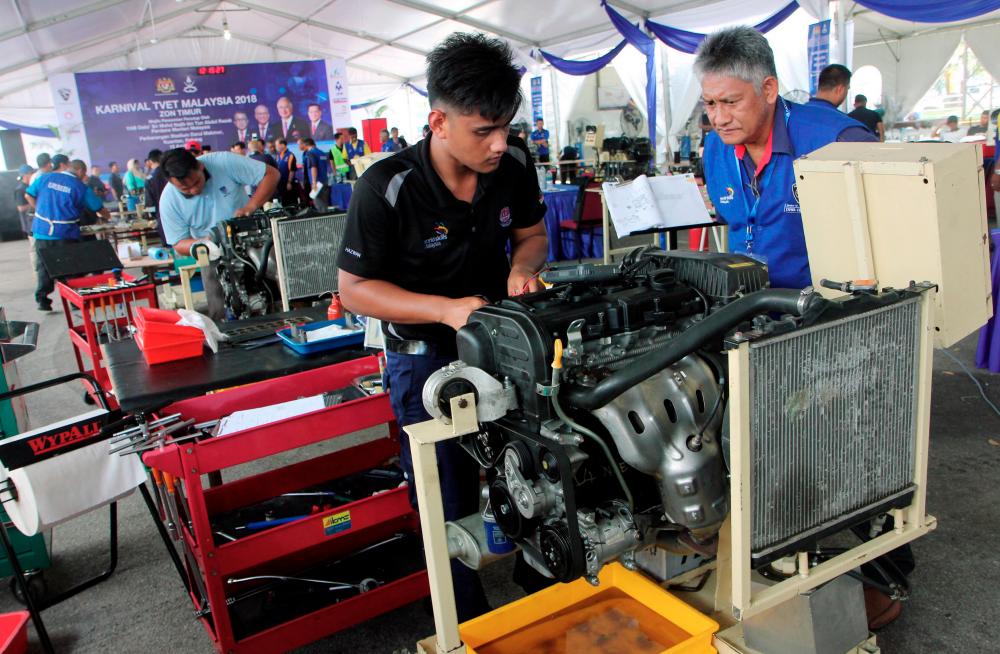PETALING JAYA: Technical and Vocational Education and Training (TVET) graduates have been told not to demand high salaries if they do not have the right skill set and industry exposure.
Federation of Malaysian Manufacturers (FMM) president Tan Sri Soh Thian Lai said TVET graduates with industry exposure through longer periods of internship and apprenticeships could command higher starting salaries.
He was commenting on Deputy Prime Minister Datuk Seri Dr Ahmad Zahid Hamidi’s recent call on employers to offer a starting salary of RM3,000 to TVET graduates.
Ahmad Zahid, who is also National TVET Council chairman, said the proposed starting salary was appropriate as TVET graduates are skilled workers who have undergone specific courses.
Soh said FMM believes a RM2,500 to RM3,000 starting salary for TVET graduates is feasible provided they have the right skill sets and industry exposure to make them work-ready.
“If TVET graduates have the appropriate industry exposure, employers need to spend only minimal time and resources to get them trained and reskilled. This would make these graduates more work-ready than one with little or no practical training.
“It is for this reason that FMM has been pushing for TVET courses to take on a ‘Place and Train’ approach and for courses to include at least 70% of practical training with industries.
“By getting industries involved in the training process of students, we would be able to absorb them as full-time employees at the end of their practical training or study term.”
Soh said having properly structured apprenticeship courses with substantial practical training would create a win-win outcome for the graduates, employers and TVET institutions whose students could be easily employed.
“We have to identify the industries within the TVET ecosystem that could play a critical role in changing the perception of parents so that more students would take up skilled courses. The perception that TVET is second class education and that skills knowledge is no longer relevant must be changed.”
He said TVET graduates currently earn lower wages because they do not meet the needs of the various industries and this calls for expensive retraining by prospective employers.
Soh added that transforming the TVET ecosystem by getting stakeholders involved in the design of courses at the development stage, implementation of academic programmes, assessment and job placements are critical to building brand recognition.
“Getting the employers’ point of view at all stages would ensure potential workers are groomed with the right skills and attitudes.
“This can be achieved with the establishment of the Government-Industry TVET Coordination Body as a single platform, and participation of stakeholders from different economic sectors,” he said.
Soh stressed that a pool of highly trained TVET graduates would be a key determinant in attracting investments and supporting the knowledge-based manufacturing ecosystem.
“It would drive innovation and productivity in a high-technology and high-value-added manufacturing environment,” he said, adding that the move up the value chain to become a high-income economy requires a skilled workforce.
Meanwhile, Malaysian Employers Federation president Datuk Dr Syed Hussain Syed Husman said starting salaries depend on the qualifications, skill set and experience of the employee as well as the company’s capacity to pay.
He said if entry-level TVET graduates are paid RM3,000, it would have repercussions on the salaries of other employees as they would demand starting pay rises, thereby increasing the operating costs of companies.
“The starting salary for any position, including those of TVET graduates, is the initial pay given to newly recruited employees and applies during probation for the first three to six months of employment.
“In cases where newly recruited employees perform well, the company is prepared to review the salary even if the employees has not served for a year,” he said.
“TVET graduates should not be too worried about their starting salaries but showcase their skills and talents when offered employment.”
Syed Hussain also said a TVET graduate with specific technical skills sought by industries can be further upskilled through on-the-job training, and thereby have a better career path which commands a higher salary.









